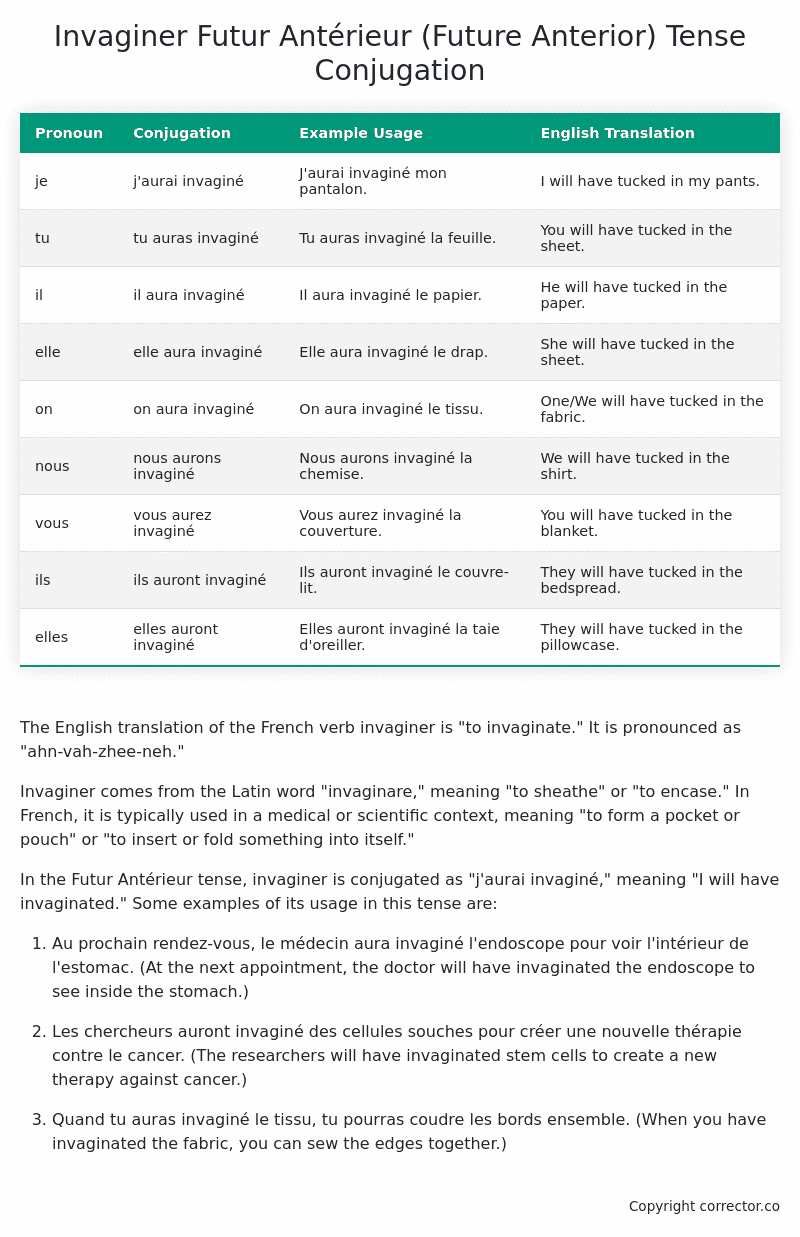Futur Antérieur (Future Anterior) Tense Conjugation of the French Verb invaginer
Introduction to the verb invaginer
The English translation of the French verb invaginer is “to invaginate.” It is pronounced as “ahn-vah-zhee-neh.”
Invaginer comes from the Latin word “invaginare,” meaning “to sheathe” or “to encase.” In French, it is typically used in a medical or scientific context, meaning “to form a pocket or pouch” or “to insert or fold something into itself.”
In the Futur Antérieur tense, invaginer is conjugated as “j’aurai invaginé,” meaning “I will have invaginated.” Some examples of its usage in this tense are:
-
Au prochain rendez-vous, le médecin aura invaginé l’endoscope pour voir l’intérieur de l’estomac. (At the next appointment, the doctor will have invaginated the endoscope to see inside the stomach.)
-
Les chercheurs auront invaginé des cellules souches pour créer une nouvelle thérapie contre le cancer. (The researchers will have invaginated stem cells to create a new therapy against cancer.)
-
Quand tu auras invaginé le tissu, tu pourras coudre les bords ensemble. (When you have invaginated the fabric, you can sew the edges together.)
Table of the Futur Antérieur (Future Anterior) Tense Conjugation of invaginer
| Pronoun | Conjugation | Example Usage | English Translation |
|---|---|---|---|
| je | j’aurai invaginé | J’aurai invaginé mon pantalon. | I will have tucked in my pants. |
| tu | tu auras invaginé | Tu auras invaginé la feuille. | You will have tucked in the sheet. |
| il | il aura invaginé | Il aura invaginé le papier. | He will have tucked in the paper. |
| elle | elle aura invaginé | Elle aura invaginé le drap. | She will have tucked in the sheet. |
| on | on aura invaginé | On aura invaginé le tissu. | One/We will have tucked in the fabric. |
| nous | nous aurons invaginé | Nous aurons invaginé la chemise. | We will have tucked in the shirt. |
| vous | vous aurez invaginé | Vous aurez invaginé la couverture. | You will have tucked in the blanket. |
| ils | ils auront invaginé | Ils auront invaginé le couvre-lit. | They will have tucked in the bedspread. |
| elles | elles auront invaginé | Elles auront invaginé la taie d’oreiller. | They will have tucked in the pillowcase. |
Other Conjugations for Invaginer.
Le Present (Present Tense) Conjugation of the French Verb invaginer
Imparfait (Imperfect) Tense Conjugation of the French Verb invaginer
Passé Simple (Simple Past) Tense Conjugation of the French Verb invaginer
Passé Composé (Present Perfect) Tense Conjugation of the French Verb invaginer
Futur Simple (Simple Future) Tense Conjugation of the French Verb invaginer
Futur Proche (Near Future) Tense Conjugation of the French Verb invaginer
Plus-que-parfait (Pluperfect) Tense Conjugation of the French Verb invaginer
Passé Antérieur (Past Anterior) Tense Conjugation of the French Verb invaginer
Futur Antérieur (Future Anterior) Tense Conjugation of the French Verb invaginer (this article)
Subjonctif Présent (Subjunctive Present) Tense Conjugation of the French Verb invaginer
Subjonctif Passé (Subjunctive Past) Tense Conjugation of the French Verb invaginer
Subjonctif Imparfait (Subjunctive Imperfect) Tense Conjugation of the French Verb invaginer
Subjonctif Plus-que-parfait (Subjunctive Pluperfect) Tense Conjugation of the French Verb invaginer
Conditionnel Présent (Conditional Present) Tense Conjugation of the French Verb invaginer
Conditionnel Passé (Conditional Past) Tense Conjugation of the French Verb invaginer
L’impératif Présent (Imperative Present) Tense Conjugation of the French Verb invaginer
L’infinitif Présent (Infinitive Present) Tense Conjugation of the French Verb invaginer
Struggling with French verbs or the language in general? Why not use our free French Grammar Checker – no registration required!
Get a FREE Download Study Sheet of this Conjugation 🔥
Simply right click the image below, click “save image” and get your free reference for the invaginer Futur Antérieur tense conjugation!

Invaginer – About the French Futur Antérieur (Future Anterior) Tense
Construction
Common Everyday Usage Patterns
Interactions with Other Tenses
For example
Summary
I hope you enjoyed this article on the verb invaginer. Still in a learning mood? Check out another TOTALLY random French verb conjugation!


